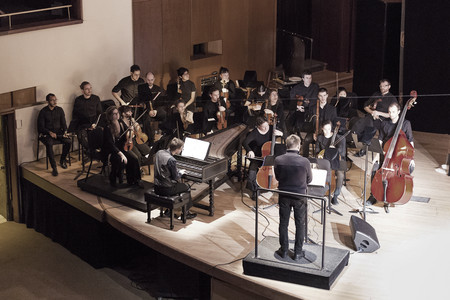Atelier de musique baroque de l’Université de Montréal (Baroque music workshop)
Under the direction of Luc Beauséjour

Created in 1976, the Atelier de musique baroque (Baroque music workshop) is a chamber music course in which students learn and experience as a group the esthetic of that rich period in music history. The different technical and interpretive aspects of the Baroque are taught and reinforced.
Under Luc Beauséjour, students are expected to work on the repertoire in a number of ensembles, vocal and instrumental. Moreover, in collaboration with the Atelier d’opéra de l’Université de Montréal (the opera workshop), a baroque production, using period instruments and with staging, is presented each year during the fall semester at Salle Claude-Champagne.
The Atelier de musique baroque is open to singers, as well as to students playing a period instrument. Moreover, those playing a modern instrument are invited to learn period instruments thanks to the advice of specialists offered as part of a mentorship. It is also possible to borrow an instrument from the Faculty of Music collection.
Baroque instruments
- Baroque bassoon (Graham Lyndon-Jones, 1982)
- German harpsichord, 2 manuals, 3 stops (Yves Beaupré, 1995)
- Flemish harpsichord, 1 manual, 2 stops (Willard Martin, 1979)
- French harpsichord, 2 manuals, 3 stops (Willard Martin, 1980)
- Italian harpsichord, 1 manual, 2 stops (Yves Beaupré, 1983)
- German flute (Friedrich von Huene, 1977)
- Baroque oboe (Toshi Hasegawa, 1979)
- Quinton (assembled as a baroque violin) (Salomon, Paris, 1760)
- Viola d’amore (Mathias Humel, Nuremberg, 18th century)
- Violas da gamba (1 treble [Uebel], 1 tenor [Uebel], 4 bass [Bertrand-Davis, Prentice, Uebel, Zuchowicz], 1 contrabass [Prentice])
- Baroque violin (Denis Cormier, 1987)
- Italian virginal (Robert Sigmund, 1974)
Resource persons
Luc Beauséjour, Director of the Atelier de musique baroque
For any questions write to: grandsensembles@musique.umontreal.ca
